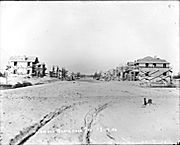| Entries |
| C |
|
Company Housing
|

|
The most ambitious and controversial project of company housing was conceived by railroad car magnate George M. Pullman, who in 1880 founded the town of Pullman on Chicago's southern suburban fringe. As part of Pullman's paternalistic social vision, his housing was designed to foster in workers the virtues of industriousness, temperance, thrift, and cleanliness. All dwellings, from the bachelor apartments to the free-standing houses, featured running water, gas, and garbage disposal. The Pullman companies maintained total control over housing: they owned the land and buildings, set the rents, screened (and evicted) tenants. In the Strike of 1894, workers protested against Pullman's refusal to lower rents during a depression.
Other industrialists opted for less intervention, building housing that they then sold to workers. Shortly before his death in 1884, Cyrus Hall McCormick instituted a program of welfare assistance that included the construction of “model cottages” to be sold at cost to his employees at the McCormick Reaper Works. U.S. Steel Corporation, negatively influenced by Pullman's example, pursued an even more hands-off approach in developing the town of Gary, Indiana, in the 1900s. Through the Gary Land Company, it sold lots and built houses for employees of the steelworking industries south of Chicago.
The Encyclopedia of Chicago © 2004 The Newberry Library. All Rights Reserved. Portions are copyrighted by other institutions and individuals. Additional information on copyright and permissions.